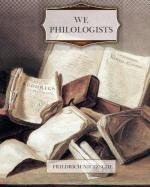59
In Wolf’s estimation, a man has reached the highest point of historical research when he is able to take a wide and general view of the whole and of the profoundly conceived distinctions in the developments in art and the different styles of art. Wolf acknowledges, however, that Winckelmann was lacking in the more common talent of philological criticism, or else he could not use it properly: “A rare mixture of a cool head and a minute and restless solicitude for hundreds of things which, insignificant in themselves, were combined in his case with a fire that swallowed up those little things, and with a gift of divination which is a vexation and an annoyance to the uninitiated.”
60
Wolf draws our attention to the fact that antiquity was acquainted only with theories of oratory and poetry which facilitated production, [Greek: technai] and artes that formed real orators and poets, “while at the present day we shall soon have theories upon which it would be as impossible to build up a speech or a poem as it would be to form a thunderstorm upon a brontological treatise.”
61
Wolf’s judgment on the amateurs of philological knowledge is noteworthy: “If they found themselves provided by nature with a mind corresponding to that of the ancients, or if they were capable of adapting themselves to other points of view and other circumstances of life, then, with even a nodding acquaintance with the best writers, they certainly acquired more from those vigorous natures, those splendid examples of thinking and acting, than most of those did who during their whole life merely offered themselves to them as interpreters.”
62
Says Wolf again . “In the end, only those few ought to attain really complete knowledge who are born with artistic talent and furnished with scholarship, and who make use of the best opportunities of securing, both theoretically and practically, the necessary technical knowledge” True!
63
Instead of forming our students on the Latin models I recommend the Greek, especially Demosthenes . simplicity! This may be seen by a reference to Leopardi, who is perhaps the greatest stylist of the century.
64
“Classical education” . what do people see in it? Something that is useless beyond rendering a period of military service unnecessary and securing a degree![5]
65
When I observe how all countries are now promoting the advancement of classical literature I say to myself, “How harmless it must be!” and then, “How useful it must be!” It brings these countries the reputation of promoting “free culture.” In order that this “freedom” may be rightly estimated, just look at the philologists!
66
Classical education! Yea, if there were only as much paganism as Goethe found and glorified in Winckelmann, even that would not be much. Now, however, that the lying Christendom of our time has taken hold of it, the thing becomes overpowering, and I cannot help expressing my disgust on the point—People firmly believe in witchcraft where this “classical education” is concerned. They, however, who possess the greatest knowledge of antiquity should likewise possess the greatest amount of culture, viz., our philologists; but what is classical about them?




